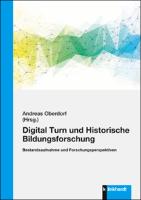Digital Turn und Historische Bildungsforschung
Bestandsaufnahme und Forschungsperspektiven
Contributor(s)
Oberdorf, Andreas (editor)
Language
GermanAbstract
In recent decades, historical educational research has developed into a field of research and work that is multifaceted in its topics, methods, and theoretical references and is interdisciplinary. The methods, working techniques, and tools of the digital humanities, which influence many areas of the humanities and cultural studies today, are also already being applied there in a variety of ways. This volume demonstrates this with concrete examples from current research projects and working groups related to historical education research. The contributions give examples of the application of selected digital tools and research methods and put research-practical as well as epistemological questions up for discussion. Historische Bildungsforschung hat sich in den letzten Jahrzehnten zu einem Forschungs- und Arbeitsgebiet entwickelt, das in seinen Themen, Methoden und theoretischen Bezügen vielseitig aufgestellt und interdisziplinär anschlussfähig ist. Auch Methoden, Arbeitstechniken und Tools der Digital Humanities, die viele Bereiche der Geistes- und Kulturwissenschaften heute beeinflussen, finden dort bereits in vielfältiger Weise Anwendung. Dies zeigt der vorliegende Band anhand konkreter Beispiele aus aktuellen Forschungsprojekten und Arbeitsgruppen mit Bezug zur historischen Bildungsforschung. Die Beiträge geben Anwendungsbeispiele für ausgewählte digitale Werkzeuge und Forschungsmethoden und stellen forschungspraktische wie auch epistemologische Fragen zur Diskussion.


 Download
Download Web Shop
Web Shop